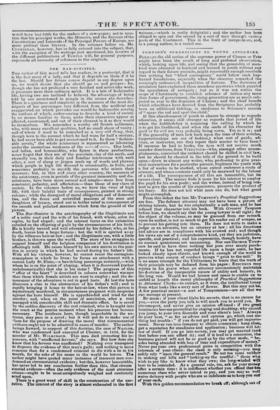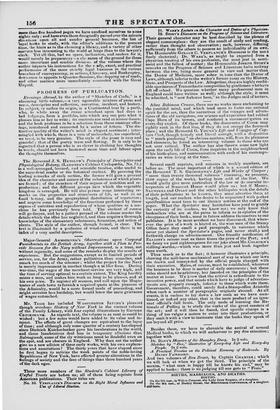TOMPSON'S SUGGESTIONS TO YOUNG ATTORNIES.
PERIIA PS the old notion of the supreme power of Chance or Fate might have been the result of long and profound observation,
which, looking upon life, and seeing that the generality of man-
kind were educated in boyhood and trained in youth without any regard to their future pursuits, might reasonably enough conclude
that nothing but " blind contingency " could follow such hap-
hazard foundations, especially when the observer remarked the seemingly undeserved inequalities of fortune. The doctrines of
revelation have explained those mundane mysteries which puzzled the speculators of antiquity ; but as it was not within the scope of Christianity to establish schemes of tuition any more than forms of government, the rising generation are as much sub- jected as ever to the dominion of Chance ; and the chief benefit which schoolboys have derived from the Scriptures has probably been an additional tickling, in obedience to Solomon's maxim of " spare the rod and spoil the child."
If this abandonment of youth to chance be strange as regards education, it seems still stranger as regards that period of life when the hobbledehoy is acquiring the calling by which he is to get his livelihood, and when the seeds of his character for good or for evil are very probably being sown. Yet so it is; and if the generality of men look back upon the time of their articles, (apprenticeships are out of fashion,) what sort of guide, ad- viser, or instructor, can they report their master to have been ? If recourse be had to books, the tyro will not receive much sounder directions, from Veraurtus—who, amongst other accom- plishments, conceived the architect should be skilled in civil law, lest he should be cheated in the title of the ground to be built upon—down to almost any writer, who, professing to give prac- tical instructions fora particular pursuit, frightens the youth with a list of works to be studied, whose extent embraces a circle of sciences, and whose contents could only be mastered by the labour of a life. The consequences of all this are lamentable, but its causes clear. The master finds it more for his interest to employ the pupil for his own profit ; and the writer, instead of being con- tent to give the results of his experience, presents the product of his fancy. He does not tell what man can do, but what genii might accomplish. From this defeat the late Mr. TOWSON'S Practical Suggestions are free. The defunct attorney may not have been a person of- shining talents, but he was emphatically a safe man, and he has infused that character into his book. With Greaves' Tompson before him, we should say that the young lawyer is all right; for the object of the volume, as may be guessed from our remark upon its author, is not so much to get his reader out of scrapes, as to prevent his getting into them. He does not write to make a judge or an advocate, but an attorney at law : all his directions and advice are in compliance with his avowed end; and though his views are not of a comprehensive kind, yet they are judicious,. specific, and practical; and his expressions, though homely, have an earnest quaintness not unamusing. Nor can GEORGE Tow,- sort be said to have done nothing but pore over musty parch- ments. If he has not regarded life upon a large scale, he has looked closely upon clients, and known enough of the world to perceive what course of conduct brings " grist to the mill." It is no mean triumph for the Utilitarians to learn that the truth of their principle may be deduced from his pages : EPICURUS may rejoice in his grave when an attorney unconsciously maintains- his doctrine of the inseparable nature of utility and honesty, in the long run. Would we had leisure and space to enable us to unfold at length the moral philosophy of Practical Suggestions to Attornies* clerks—to extract, as it were, the intellectual honey from what looks like a sorry sort of flower. But this may not be. A few practical mems—a sort of Tompsoniana—are all that we- can manage at present. Be mum: if your client blabs his secrets, that is no excuse for you,—even the party you talk to will mark you to avoid you. Be circumspect, and never give an opinion off-hand if two great luminaries become proverbial for staying and doubting, why should you jump, to your own discredit and your client's loss ? Always do your best, " so far as advice and opinion go, which cost no- thing but trouble : " if you do not get paid, you will get improve- ment. Never run into company to obtain connexion: keep close, get a reputation for steadiness and application; business will fol- low of itself. If you go into society, you may get married (and that before you can afford it); and if it lead to a connexion, the business gained will not be so good as by the other mode, " be- sides being attended with loss of time and expenditure of money? Never put your own professional gains in competition with the interests of your client: the clash is only seeming—you .may safely rely " upon the general result." Be not too tame nelther in making out bills and "looking-up the needful :'' those who wish to pay like to know what they owe; the long-winded will bear to be reminded. As a general rule, too, ask for your money after a certain time : it is indifferent whether you offend that too. numerous class who never intend to pay, and you may as well waive delicacy with people who are so indelicate as to keep you =t- or your cash. With this golden recommendation we break off; although out of
Isere than five hundred pages we have confined ourselves to some eights only ; and haveeven there designedly passed over the minute elinctions upon all and sundry general business, the list of "legal boo to study, with the editor's additions to the present time, Ihe hints as to the choosing a library, and a variety of other mutters less interesting to the world at large than to the lawyer's .clerk. Yet all this, had we space, inclination, and readers for it, -would merely be preparatory—a de: ranee of the ground for those 'more important and erudite divisions of the volume where the author imparts his instructions for the r. ady, exact, and practical performance of the more strictly legal business in the various 'branches of conveyancing, in actions, Chancery, and Bankruptcy, down even to appeals to Quarter-Sessions, the stopping up of roads, and other matters more immediately connected with the Great :Unpaid.



























 Previous page
Previous page